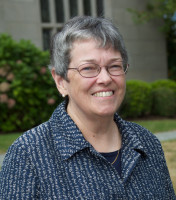Hospice & Palliative Care of Westchester Provides Life-Giving Support to the Severely Sick

It may surprise many unfamiliar with the work of Hospice & Palliative Care of Westchester (HPCW) that on a daily basis this organization works with patients and their families to celebrate life.
The philosophy at HPCW embraces care for the patient facing a life-limiting or serious illness that addresses their fears and concerns as well as palliative comfort for physical symptoms with a home-based program that closely involves caregivers and family.
At the core is compassion. Because the work encompasses the emotional, psychological and spiritual needs of all involved as well as the medical and physical needs of the patient, the experience is often described as a gift that expresses the preciousness of life.
As HPCW celebrated its 20th anniversary in 2012 it also welcomed new Executive Director Mary K. Spengler who has taken up the mission to expand HPCW’s work in the community.
Spengler brings vast experience to her position. She served as Vice President at White Plains Hospital and as Director of Nursing there before becoming Vice President of Nursing. In 1991 she was designated by White Plains Hospital CEO Jon Schandler to establish a joint hospice program with Visiting Nurses of Westchester, which later became Hospice of Westchester and then HPCW.
Over the past 20 years Spengler has served on HPCW’s board and chaired numerous committees.
In an interview with The White Plains Examiner last week Spengler described three misconceptions about hospice care that she is determined to dispel. The first is that hospice is a place.
“Many people think hospice means a specific place or institution where terminally ill patients go,” Spengler explained. “That is not the case with HPCW. We provide a team that goes into a patient’s home or to the nursing home where they are being cared for. A unique comprehensive program is developed for each individual patient.”
The second misconception is that a cancer diagnosis is required for a patient to enter hospice. “About 35 to 40 percent of our patients have cancer,” Spengler said. “We have many patients with cardiac conditions, neurological diseases like ALS, and those suffering from dementia and Alzheimer’s disease. Often, hospice care for Alzheimer’s patients is at the nursing home.”
The third issue is that patients are referred too late, often only a week before they pass, a problem Spengler believes is related to lack of knowledge by the public in general.
“The decision to go with hospice is a life choice,” Spengler clarified. “It allows a patient and their family time to transition. Medicare requires a six-month diagnosis from the patient’s physician, but this can be extended.”
Once the decision to go with hospice has been made the HPCW team sets up a plan of care. The team consists of a medical director, registered nurses, licensed social workers, spiritual counselors, certified home health aides and volunteers.
The program involves little or no cost to the patient and may include up to four hours a day of home health care if a patient qualifies.
Complementary services include massage, music therapy, pet therapy, reflexology and acupuncture. The patient decides if they want a volunteer to visit.
All the services provided in a patient’s home are also offered to patients living in a nursing home. Each plan is developed in discussion with the patient and caregivers and is individualized to specific needs.
HPCW also offers 13 months of bereavement support to patient’s families following the loss of their loved one. These are offered in groupings such as parental or spousal and include individual counseling, support groups and mailings.
With a view to the younger population, during the past year HPCW under Spengler’s guidance has been developing a pediatric palliative care program.
“This is a unique program because children are not little adults,” she said. “We have a whole team specifically trained in the care of children that offers the same core services, but with a focus on the child.”
Spengler believes the effectiveness of HPCW rests with the people who work and volunteer there.
The offices at 311 North Street in White Plains provide space for the administration and field staff and includes areas where volunteers can come and go and team meetings take place.
‘These are special people,” Spengler notes. “They come to this work with much experience, wisdom and devotion, and a profound respect for people’s end of life. They understand where hospice fits in the clinical setting.”
In a society where discussion about death is often avoided, it is difficult to get the message out that people are not alone, that there is help along the journey, which is a natural progression. With pain management and symptom control, Spengler says a calm develops.
HPCW is reaching out to the entire community through lunch and learn opportunities and other educational programs to get the message out. They believe if people are aware of what is available, when they find themselves in a situation where they have to make decisions, they will know where to turn.
To find out more about HPCW visit HospiceofWestchester.com or call 914-682-1484.
